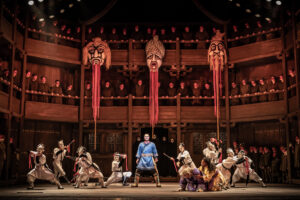
Royal Opera House 2022-23 Review: Turandot
Sleepiness Peaks Early in this Wan Reprisal of a 1984 Production
By Sophia LambtonPhoto: Marc Brenner/ROH
Somnific fiction is the stuff of bedtime stories starring beasts and feasts of the absurd: displays of madness only children could endure pre-slumber. Lumbering imaginations with beguilement, it refrains from the revilement of base villains, wrapping them instead in tangible entrancement. This enhancement of surrealness makes the fairytale the tender tooth’s apéritif: a nightly dose of magical illusions luring restless minds to sleep.
Not so for anxious adults stuck in realism: the eleven o’clock news, tomorrow’s deadlines, and the city’s howls and rumbles. Yet the heightened plight of characters in “Turandot” – Puccini’s final opera posthumously finished by Franco Alfano – exceeds even its genre’s lofty stakes. The ghastly Chinese princess of the title forces would-be suitors to solve answers to three riddles: error equals execution.
Menacingly joining her is the accompaniment of rattling snare drums, goosebump-stirring gongs, and spectral glockenspiels. Dainty melodies emerge in specious joy on these and piquant piccolos to stress harmonious submission among Peking’s villagers: a throng dressed in identical brown outfits in Andrei Serban’s simplistic staging.
Centered on communal deference before sovereign rule, the ROH’s season première of this 39-year-old production proffered a conceptualized homogeneity: brown stacks of the inhabitants’ small huts remained onstage throughout to camouflage its chorus. Lined with galleries, they let the residents of Peking gaze upon egregious acts and suicide, and danger with the gaping mouths of cinephiles. Conformity was, without doubt, the nucleus of the director’s manifest conceit. Its execution, nonetheless, has worn demonstratively thin – with dancers falling out of sync and denizens’ respectful movement growing uncharacteristically loose.
Mystical in Morsels
Immersing its rich myriad of musical motifs in luxury, Antonio Pappano’s opening night treatment of the work was mystical in morsels. Too conspicuously, it offered wrangling brass that squeaked and shrieked; a grumbling drone of tubas made its presence overfelt. Swaying strings of swift, light-pressure tremolo was lent superfluous innocuousness in an opera rich in cruelty. At times their volume lapsed too suddenly into a timid pianissimo; at others, their rubato was a wistful serenade. The accents that emerged were sometimes reminiscent of a wooing fiddler at a restaurant. Offsetting onstage tragedy, the music melted into maudlin moments echoing emotionality in Beniamino Gigli’s take on Neapolitan canzone “Cor ‘ngrato:” drama came undone at overwrought sentimentality.
Aglow, in similar designs, was Yonghoon Lee as Calaf, an unfearing tenor with a tightly trained, impenetrable timbre. Steeliness embodied his audacity as he addressed despotic Princess Turandot (“Ch’io ti veda, ch’io ti maledica! (Let me see you, let me curse you!)” with relentless top notes. Legato-lined vibrato made for comely throbs throughout a voice prepared for this role’s countless challenges. Like many tenors, nonetheless, his mime fell prey to widespread arm-raising, and in sporadic bouts of overstress, he swapped a radiant crescendo for a semi-mute diminuendo. One occurred in “Nessun dorma’s” ‘le stelle che tremano d’amore e di speranza (the stars that tremble both from love and hope).’ Each of the notes became a saccharine diminuendo inconsistent with his hero’s might. When Lee embarked on “Ed il mio bacio scioglierà il silenzio che ti fa mia! (And my kiss will melt the silence that makes you mine!),” he clung onto a pillar. He embraced it, singing “mia,” muffling the first syllable. It was a performance bolstered by potential that has yet to reach its realization.
As the ice queen Turandot, Anna Pirozzi met with episodes of victory and struggle, much like her melodic alter-ego. At the start of her “In questa reggia,” a strong forte fell into a breathless pianissimo in “grido disperato risuonò (a desperate cry rang out).” Vulnerability was heard in instances such as “la sua fresca voce,” when Turandot remembered ancestress Lou-Ling and the portrayer’s iron-willed soprano dropped into a semi-whisper. Her protagonist’s almost indifference to brutality was palpable as she relayed her riddle, contrasting with self-amusing irony the words “candida… ed oscura (white… and dark).” Pirozzi zealously grasped well-sustained high notes in bouts of bold legato – but they faced a scattered presence in a presentation still in progress.
Conjuring Pain
Tendering much-needed tenderness to Liù, soprano Masabane Cecilia Rangwanasha was the sole performer of the spectacle able to conjure pain. Although she struggled intermittently with breath support in certain phrases of “Signore, ascolta” – sinking the “sorriso” of “l’ombra d’un sorriso (“the shadow of a smile)”—the singer sealed her bell-like voice with ardent suffering. Her summons of “Pietà! (Have pity!)” tingled with a crystalline intonement of lamentable self-sacrifice. In this way, Liù became the central pathos of this staggering production, presaging the fate of Turandot by warning “l’amerai anche tu (and you will love him too)” with anguished helplessness. A well-supported voice dealt her avowals reverential valor: hers was the most human creature in this largely artificial exhibition.
Bass Vitalij Kowaljow intensified our empathy for daughter Liù with both well-regulated forte lashings and diminuendo self-surrender in his malleable voice. Nostalgic for his lake house in Honan, Hansung Yoo’s Ping wrapped memories in warmth throughout his arioso in Act two (“Ho una casa nell’Honan”), while Alexander Kravets’ Emperor Altoum was a vigorously executed vocal vehicle. Yet it’s a shame that Kravets—as far as the eye can see—did not make any physical appearance but instead supplied the audio for a robot on a throne whose hand compulsively kept shaking in the final act.
Scant light was stirred into this staid production that descended a huge cardboard moon to reference nighttime and unraveled a large painted cloth screen to depict Honan. Its rendering was a sophisticated puppetry whose dark shades sent to sleep those out to watch the adult fable that is “Turandot”— a healthy antidote for those attending with bored children but no source of relish for the well-versed opera-lover.



